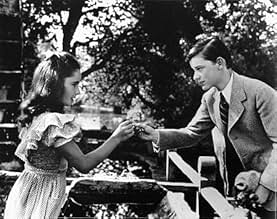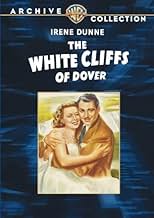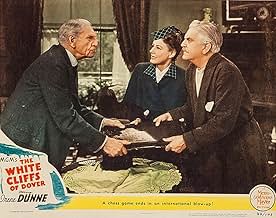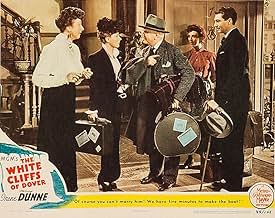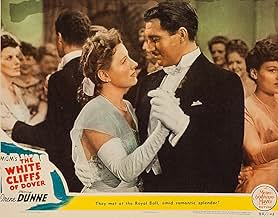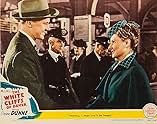ÉVALUATION IMDb
7,0/10
1,9 k
MA NOTE
Susan voyage avec son père en Angleterre pour des vacances. Invitée à un bal, Susan rencontre Sir John Ashwood et l'épouse après une romance éclair. Cependant, l'Américaine Susan ne s'adapte... Tout lireSusan voyage avec son père en Angleterre pour des vacances. Invitée à un bal, Susan rencontre Sir John Ashwood et l'épouse après une romance éclair. Cependant, l'Américaine Susan ne s'adapte jamais.Susan voyage avec son père en Angleterre pour des vacances. Invitée à un bal, Susan rencontre Sir John Ashwood et l'épouse après une romance éclair. Cependant, l'Américaine Susan ne s'adapte jamais.
- Nommé pour 1 oscar
- 1 nomination au total
May Whitty
- Nanny
- (as Dame May Whitty)
Harry Allen
- English Cabbie
- (uncredited)
Wilson Benge
- Chauffeur
- (uncredited)
Matthew Boulton
- Immigration Officer
- (uncredited)
Edmund Breon
- Major Rupert Bancroft
- (uncredited)
Clifford Brooke
- Indian Major in Boardinghouse
- (uncredited)
Histoire
Le saviez-vous
- AnecdotesIrene Dunne reads a telegram from her Anglophobe father to a group of English people. Her father begs her not to marry an Englishman she is in love with and tells her "You're a Yankee through and through! Think of Paul Revere! Think of the Old North steeple! Remember the Alabama!" The viewer may become confused at this point. "Remember the Alabama"? Shouldn't it be "Remember the Alamo"? However, since the context of the telegram is anti-British any mention of the Alamo would be irrelevant. What Irene Dunne's father is apparently taking about is the C.S.S. Alabama, one of several Confederate warships that were built in British shipyards over United States protest during the Civil War. These ships attacked U.S. shipping in the Atlantic Ocean. Since Irene Dunne arrives in England in April of 1914 and married just before August 4, 1914 when Great Britain declared war on Germany, the telegram was probably sent close to the 50th anniversary of the sinking of the Alabama by the U.S.S. Kearsarge on June 19, 1864 in the English Channel. The United States sued Great Britain in 1869 over the building of the Confederate warships and was awarded $15.5 million.
- GaffesA gift with a plaque dedicated to First Lady, Dolley Madison, misspells her name "Dolly Madison."
- Citations
Susan Dunn's landlady: [Of Susan]
Susan Dunn's landlady: Such a nice young thing! Not a bit like an American.
- Autres versionsElizabeth Taylor's scenes are often deleted in older TV prints.
- ConnexionsFeatured in Twenty Years After (1944)
- Bandes originalesAuld Lang Syne
(1788) (uncredited)
Traditional Scottish 17th century music
Lyrics by Robert Burns
Played during the opening credits and often in the score
Commentaire en vedette
Irene Dunne is all in all herself, tender, transformative and powerful as an American girl who travels to England and falls in love with an English member of the aristocracy. Beautiful Irene marries the Englishman but their honeymoon is cut short on its first day as World War I breaks out. Director Clarence Brown's leisurely mood effect causes us to feel as disrupted as they do. Perhaps it is the soothing joy derived from the old-style black-and-white 35mm Spherical look, a classicism in George J. Folsey's cozy cinematography, that creates such a peaceful atmosphere. Believe me: This feeling is augmented by seeing it on a VHS tape, almost as though you are watching a timeworn relic. When the film quietly, serenely begins, Irene reflects upon her feelings relating to her life in England, a life she never expected to lead from event to event beginning with her purely dabbling arrival. The moving musical score fits like a velvet glove over the sustained close shot of her gorgeous face and the iceberg-thawing sound of her voice.
The backbiting between Irene and her English counterparts early in the film is funny, posing one of the movie's unanxious emotional successes which as well include strong romantic and maternal joys and longings, WWI, brief bursts of rage, mourning, WWII, and the like. A scene in the movie circa the early 1930s sends a chill down the spine, illustrating two polite adolescent German boys, part of an exchange program, staying at the English family's countryside manor. Intimating they were part of early Nazi invasion plans, the boys let it slip in a conversation's startling turn for the less comfortable that they are pondering how the estate's large green would be perfect on which for troop gliders to land.
The backbiting between Irene and her English counterparts early in the film is funny, posing one of the movie's unanxious emotional successes which as well include strong romantic and maternal joys and longings, WWI, brief bursts of rage, mourning, WWII, and the like. A scene in the movie circa the early 1930s sends a chill down the spine, illustrating two polite adolescent German boys, part of an exchange program, staying at the English family's countryside manor. Intimating they were part of early Nazi invasion plans, the boys let it slip in a conversation's startling turn for the less comfortable that they are pondering how the estate's large green would be perfect on which for troop gliders to land.
- jzappa
- 6 sept. 2008
- Lien permanent
Meilleurs choix
Connectez-vous pour évaluer et surveiller les recommandations personnalisées
Détails
- Date de sortie
- Pays d’origine
- Langues
- Aussi connu sous le nom de
- The White Cliffs of Dover
- Lieux de tournage
- société de production
- Consultez plus de crédits d'entreprise sur IMDbPro
- Durée2 heures 6 minutes
- Couleur
- Rapport de forme
- 1.37 : 1
Contribuer à cette page
Suggérer une modification ou ajouter du contenu manquant

Lacune principale
By what name was White Cliffs of Dover (1944) officially released in India in English?
Répondre

